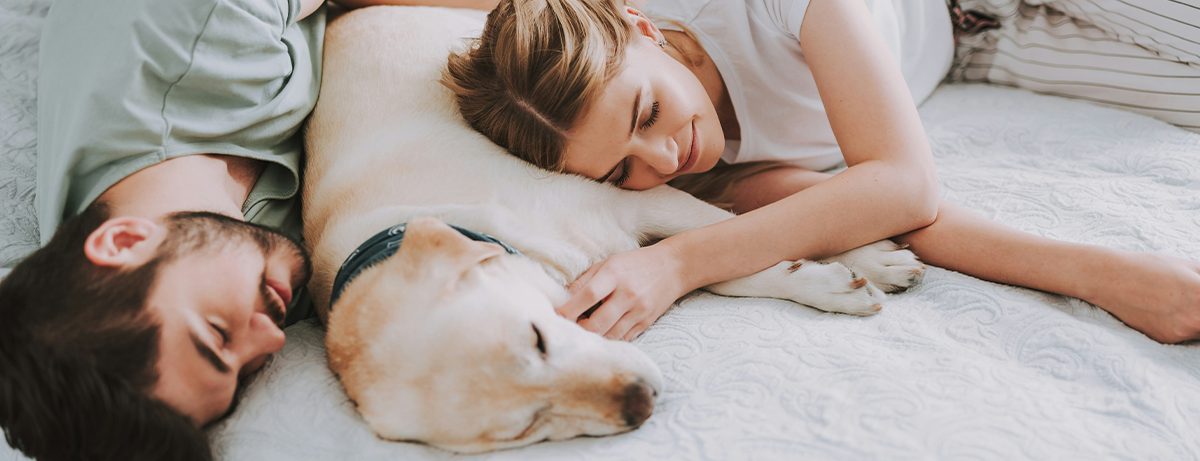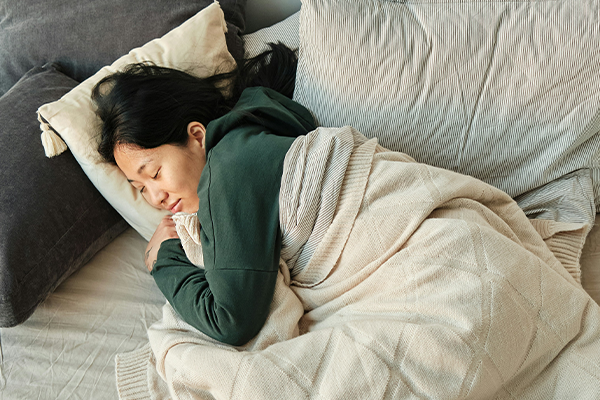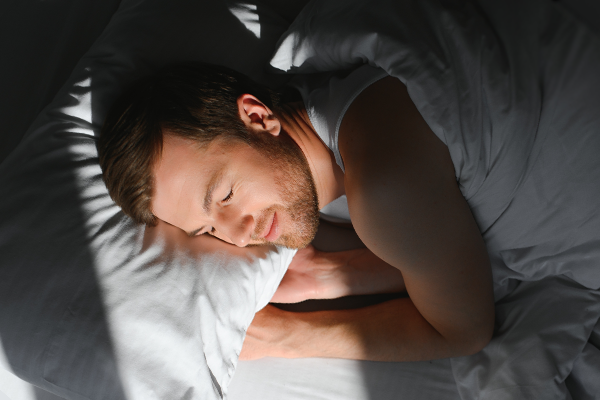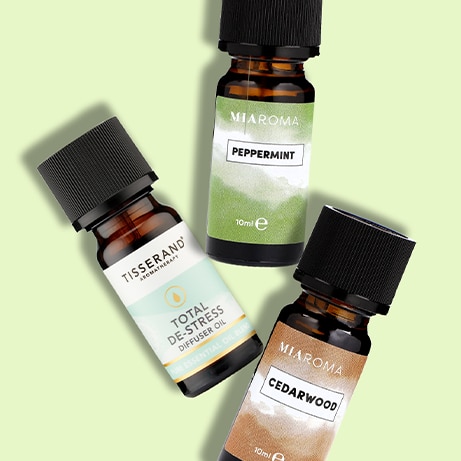15% off £25 or 20% off £35
Code:BASKET
Why sleep is important for your health

Coffee can’t replace it, naps can’t cheat it: sleep is your body’s most powerful repair tool. Here’s why it’s essential for both mind and body.
Summary
1What happens when you sleep?
Sleep might seem like ‘switching off’, but beneath the surface, your body and brain are hard at work, following a precise series of processes…
2Sleep stages
Every 90 minutes, your brain cycles through four distinct sleep stages, each with a unique purpose…
3Why do we need sleep?
Sleep is your body’s built-in maintenance system. Without it, everything from your mood to your metabolism takes a hit…
Have you ever had a day where coffee just doesn’t cut it? Maybe your focus fades, cravings spike or even small tasks feel overwhelming…
Sleep is your body’s ultimate reset, yet it’s often the first thing we sacrifice for working overtime, binge-watching a series or late-night scrolling. But those lost hours add up – and they can take a toll.1
So, why is sleep so important? And what happens when you don’t get enough? Let’s break it down.
What really happens when you sleep?
Sleep isn’t just downtime – it’s your body’s overnight maintenance shift, working behind the scenes to refresh your brain, recharge your body and keep everything running smoothly for the day ahead.2
Sleep stages
Every 90 minutes, your brain cycles through four distinct sleep stages, each with a unique purpose:2,6
- stage 1 (light sleep): the transition from wakefulness to sleep. Your breathing slows, muscles relax and your brain waves begin to shift
- stage 2 (deeper relaxation): your heart rate and body temperature drop, while brain activity becomes more rhythmic as you settle into deeper sleep
- stage 3 (deep sleep): the most restorative phase, where muscle repair, immune function and cell regeneration occur
- stage 4 (REM sleep): your brain becomes highly active, creating dreams and consolidating memories. Your body enters a temporary state of muscle paralysis to prevent you from acting out your dreams
Did you know? You go through four to six sleep cycles per night and typically need seven to nine hours of sleep.6,12

Why do we need sleep?
Sleep is your body’s built-in maintenance system. Without it, everything from your mood to your metabolism takes a hit.2 Here’s why sleep is important:
While you sleep, your body releases proteins called cytokines that help fight infections, reduce inflammation and manage stress.13 A good night’s sleep strengthens your immune system, helping you to recover faster.
Sleep helps your brain organise information, store memories and enhance learning.14,15 Deep sleep locks in memories, while REM sleep boosts creativity and problem-solving.
During very deep sleep, known as stage three, your heart rate slows and blood pressure drops, giving your cardiovascular system time to recover.6
Sleep may also help regulate inflammation and stress hormones, which can contribute to heart disease and stroke.16-18
Sleep helps regulate serotonin and dopamine, two key chemicals that contribute to mood stability and stress reduction.19 It also helps you process emotions, making it easier to handle daily challenges.20
Sleep regulates the hormones that control appetite and metabolism, including:21-24
- ghrelin (the hunger hormone)
- leptin (the fullness hormone)
- cortisol (the stress hormone)
They don’t call it beauty sleep for nothing! Quality sleep helps support skin health by maintaining its barrier function, promoting hydration and helping to keep it looking youthful and resilient.25-27
Deep sleep is crucial for muscle repair and recovery. Growth hormone surges at night, aiding muscle growth and tissue regeneration.8,28
During deep sleep, your brain clears out toxins, including beta-amyloid – a protein linked to Alzheimer’s disease and memory loss.29,30 This natural ‘cleaning process’ helps protect long-term brain health and may lower the risk of neurodegenerative diseases.31

What happens if you don’t get enough sleep?
So, you think you can function just fine on 4–5 hours of sleep? Your body begs to differ. Even mild sleep deprivation can have big effects on your brain, body and emotional health.32
Poor sleep may reduce your body’s ability to fight infections, making you more susceptible to colds and other infections.33
Lack of sleep leads to brain fog, slower reaction times and poor concentration, making it harder to learn, recall information and make decisions.34
Chronic sleep deprivation could put extra strain on your heart, increasing your risk of heart disease, stroke and high blood pressure.32
Sleep deprivation makes it harder to regulate emotions, leading to irritability, mood swings and increased stress levels.35 Research suggests a link between long-term sleep loss and higher risks of depression and anxiety.36
Poor sleep disrupts hunger hormones, ramps up cravings and slows metabolism, making weight management more difficult. For example:21
- ghrelin increases with sleep deprivation, making you crave more food
- leptin decreases, making it harder to feel satisfied
- cortisol rises, which can promote fat storage and cravings for sugary foods
Poor sleep throws off hormone regulation, which can affect fertility, lower sex drive and disrupt reproductive health in both men and women.37
Research shows that poor sleep quality is linked to increased signs of skin aging, reduced skin barrier function and lower satisfaction with appearance.25-27 Poor sleep quality also increases inflammation and disrupts skin function, potentially worsening acne and other inflammatory skin conditions.38
Reaction time, endurance and coordination all decline without enough sleep, making physical tasks feel harder and raising the risk of injuries and accidents.39
Chronic sleep loss may allow toxins to build up in the brain, increasing the risk of Alzheimer’s disease and dementia.40 While research links poor sleep to cognitive decline, it’s still unclear if improving sleep can fully prevent these diseases.

How to improve your sleep quality
Sometimes it’s not about wanting more sleep, but about making it easier for your body and mind to rest properly. The good news? Small, practical changes can add up to better quality sleep, and here are some of those expert-backed strategies that could make a big difference:41
Your body thrives on rhythm. Going to bed and waking up at the same time every day (yes, even on weekends) helps stabilise your circadian rhythm, your body’s internal clock. Over time, this makes it easier to drift off naturally and wake up feeling refreshed.
Think of your bedroom as your personal sleep sanctuary. Keep it cool, dark and quiet to encourage deeper rest. Blackout blinds, eye masks, earplugs or even white-noise machines can help if your surroundings are noisy. When it comes to lighting, this is a no “big light” zone - swapping bright overhead lights for softer, warmer lamps in the evening tells your brain it’s time to wind down.
The little choices you make in the evening can influence how easily you nod off. Caffeine lingers in your system for several hours, so cutting back in the afternoon can prevent it from disrupting your sleep. Alcohol might make you feel drowsy, but it often leads to restless, fragmented sleep later in the night. And as for screens, the blue light from phones, tablets and TVs can trick your brain into staying alert, so aim to switch off at least an hour before bed.
Exposure to natural light during the day helps regulate melatonin, the hormone that signals when it’s time to sleep. Try to get outside in the morning or on your lunch break. Pair this with regular physical activity during the day, even light movement like walking or yoga, and you may find it easier to wind down at night. Just keep vigorous exercise to earlier in the day so your body has time to relax.
Working these habits into your routine can help you fall asleep faster, stay asleep longer and wake up feeling refreshed.41

The final say
Sleep is as essential as nutrition and exercise. Prioritising good sleep is one of the best things you can do for your health.32 By understanding how much sleep you need, recognising the risks of sleep deprivation and making small changes to your routine, you can boost your mood, improve concentration and enhance your overall wellbeing.14,19,32
Tonight, why not put your phone down a little earlier, wind down with a calming activity and prioritise your sleep? Your body (and mind) will thank you.
Are you fed up with tossing and turning through sleepless nights? Check out our guide to sleeping better.
Disclaimer - The advice in this article is for information only and should not replace medical care. Please check with your GP or healthcare professional before trying any supplements, treatments or remedies. Food supplements must not be used as a substitute for a varied and balanced diet and a healthy lifestyle.
While we strive for accuracy and balance, please be aware that this article may discuss products available for purchase through Holland & Barrett. Consult a healthcare professional before making any health-related decisions.
1. Ramos AR, et al. Sleep deprivation, sleep disorders, and chronic disease. Prev Chron Dis. 2023;20:E77. https://doi.org/10.5888/pcd20.230197
2. National Institute of Neurological Disorders and Stroke. Brain basics: Understanding sleep [Internet]. [cited 2025 Feb 21]. Available from: https://www.ninds.nih.gov/health-information/public-education/brain-basics/brain-basics-understanding-sleep
3. Reddy S, et al. Physiology, circadian rhythm. Treasure Island (FL): StatPearls Publishing; 2023. Available from: https://www.ncbi.nlm.nih.gov/books/NBK519507/
4. Huang L, et al. Functions and mechanisms of adenosine and its receptors in sleep regulation. Sleep Med. 2024;115:210–17. https://doi.org/10.1016/j.sleep.2024.02.012
5. Harding E, et al. Sleep and thermoregulation. Curr Opin Physiol. 2020;15:7–13. https://doi.org/10.1016/j.cophys.2019.11.008
6. Patel AK, et al. Physiology, sleep stages. Treasure Island (FL): StatPearls Publishing; 2024. Available from: https://www.ncbi.nlm.nih.gov/books/NBK526132/
7. Kim TW, et al. The impact of sleep and circadian disturbance on hormones and metabolism. Int J Endocrinol. 2015;2015(591729):1–9. https://doi.org/10.1155/2015/591729
8. Dáttilo M, et al. Effects of sleep deprivation on acute skeletal muscle recovery after exercise. Med Sci Sports Exerc. 2020;52(2):507–14. https://doi.org/10.1249/mss.0000000000002137
9. Fink AM, et al. Autonomic regulation during sleep and wakefulness: A review with implications for defining the pathophysiology of neurological disorders. Clin Auton Res. 2018;28(6):509–18. Available from: https://www.ncbi.nlm.nih.gov/pmc/articles/PMC6542468/
10. Lollies F, et al. Associations of sleep and emotion regulation processes in childhood and adolescence - a systematic review, report of methodological challenges and future directions. Sleep Sci. 2022;15(4):490–514. https://doi.org/10.5935/1984-0063.20220082
11. Reddy OC, van der Werf YD. The sleeping brain: Harnessing the power of the glymphatic system through lifestyle choices. Brain Sci. 2020;10(11):868. https://doi.org/10.3390/brainsci10110868
12. National Heart, Lung, and Blood Institute. How sleep works: How much sleep is enough? [Internet]. [cited 2025 Feb 21]. Available from: https://www.nhlbi.nih.gov/health/sleep/how-much-sleep
13. Besedovsky L, et al. The sleep-immune crosstalk in health and disease. Physiol Rev. 2019;99(3):1325–80. https://doi.org/10.1152/physrev.00010.2018
14. Paller KA, et al. Memory and sleep: How sleep cognition can change the waking mind for the better. Annu Rev Psychol. 2020;72:123–50. https://doi.org/10.1146/annurev-psych-010419-050815
15. Lewis PA, et al. How memory replay in sleep boosts creative problem-solving. Trends Cogn Sci. 2018;22(6):491–503. Available from: https://pmc.ncbi.nlm.nih.gov/articles/PMC7543772/
16. Dzierzewski JM, et al. Sleep inconsistency and markers of inflammation. Front Neurol. 2020;11:1042. https://doi.org/10.3389/fneur.2020.01042
17. Thompson KI, et al. Acute sleep deprivation disrupts emotion, cognition, inflammation, and cortisol in young healthy adults. Front Behav Neurosci. 2022;16:945661. https://doi.org/10.3389/fnbeh.2022.945661
18. Tsai SY, et al. Association of stress hormones and the risk of cardiovascular diseases systematic review and meta-analysis. Int J Cardiol Cardiovasc Risk Prev. 2024;23:200305. https://doi.org/10.1016/j.ijcrp.2024.200305
19. Bhat A, et al. Effects of sleep deprivation on the tryptophan metabolism. Int J Tryptophan Res. 2020;13:117864692097090. https://doi.org/10.1177/1178646920970902
20. Tempesta D, et al. Sleep and emotional processing. Sleep Med Rev. 2018;40:183–95. https://doi.org/10.1016/j.smrv.2017.12.005
21. Rogers EM, et al. The effects of sleep disruption on metabolism, hunger, and satiety, and the influence of psychosocial stress and exercise: A narrative review. Diabetes Metab Res Rev. 2023;40(2):e3667. https://doi.org/10.1002/dmrr.3667
22. Young ER, Jialal I. Biochemistry, ghrelin. Treasure Island (FL): StatPearls Publishing; 2023. Available from: https://www.ncbi.nlm.nih.gov/books/NBK547692/
23. Dornbush S, Aeddula NR. Physiology, leptin. Treasure Island (FL): StatPearls Publishing; 2023. Available from: https://www.ncbi.nlm.nih.gov/books/NBK537038/
24. Thau L, et al. Physiology, cortisol. Treasure Island (FL): StatPearls Publishing; 2023. Available from: https://www.ncbi.nlm.nih.gov/books/NBK538239/
25. Léger D, et al. “You look sleepy…” The impact of sleep restriction on skin parameters and facial appearance of 24 women. Sleep Med. 2022;89:97–103. https://doi.org/10.1016/j.sleep.2021.11.011
26. Shao L, et al. Regular late bedtime significantly affects the skin physiological characteristics and skin bacterial microbiome. Clin Cosmet Investig Dermatol. 2022;7;15:1051–63. https://doi.org/10.2147/CCID.S364542
27. Passeron T, et al. Adult skin acute stress responses to short‐term environmental and internal aggression from exposome factors. J Eur Acad Dermatol Venereol. 2021;35(10):1963–75. https://doi.org/10.1111/jdv.17432
28. Zaffanello M, et al. Complex relationship between growth hormone and sleep in children: Insights, discrepancies, and implications. Front Endocrinol. 2024:14:1332114. https://doi.org/10.3389/fendo.2023.1332114
29. Shokri-Kojori E, et al. β-Amyloid accumulation in the human brain after one night of sleep deprivation. Proc Natl Acad Sci U S A. 2018;115(17):4483–8. https://doi.org/10.1073/pnas.1721694115
30. Rukmangadachar LA, Bollu PC. Amyloid beta peptide. Treasure Island (FL): StatPearls Publishing; 2023. Available from: https://www.ncbi.nlm.nih.gov/books/NBK459119/
31. Lv YN, et al. Sleep deficiency promotes Alzheimer’s disease development and progression. Front Neurol. 2022;13:1053942. https://doi.org/10.3389/fneur.2022.1053942
32. National Heart, Lung, and Blood Institute. What are sleep deprivation and deficiency? [Internet]. [cited 2025 Feb 21]. Available from: https://www.nhlbi.nih.gov/health/sleep-deprivation
33. Robinson CH, et al. The relationship between duration and quality of sleep and upper respiratory tract infections: A systematic review. Family Pract. 2021;38(6):802–10. https://doi.org/10.1093/fampra/cmab033
34. Krause AJ, et al. The sleep-deprived human brain. Nat Rev Neurosci. 2017;18(7):404–18. Available from: https://pmc.ncbi.nlm.nih.gov/articles/PMC6143346/
35. Saghir Z, et al. The amygdala, sleep debt, sleep deprivation, and the emotion of anger: A possible connection? Cureus. 2018;10(7):e2912. https://doi.org/10.7759/cureus.2912
36. Yasugaki S, et al. Bidirectional relationship between sleep and depression. Neurosci Res. 2025:211:57–64. https://doi.org/10.1016/j.neures.2023.04.006
37. Lateef OM, Akintubosun MO. Sleep and reproductive health. J Circadian Rhythms. 2020;18:1. https://doi.org/10.5334/jcr.190
38. Schrom KP, et al. Acne severity and sleep quality in adults. Clocks Sleep. 2019;1(4):510–16. https://doi.org/10.3390/clockssleep1040039
39. Craven J, et al. Effects of acute sleep loss on physical performance: A systematic and meta-analytical review. Sports Med. 2022;52(11):2669–90. https://doi.org/10.1007/s40279-022-01706-y
40. Sadeghmousavi S, et al. The effect of insomnia on development of Alzheimer’s disease. J Neuroinflammation. 2020;17(1):289. https://doi.org/10.1186/s12974-020-01960-9
41. National Heart, Lung, and Blood Institute. Insomnia: Treatment [Internet]. [cited 2025 Feb 21]. Available from: https://www.nhlbi.nih.gov/health/insomnia/treatment/














